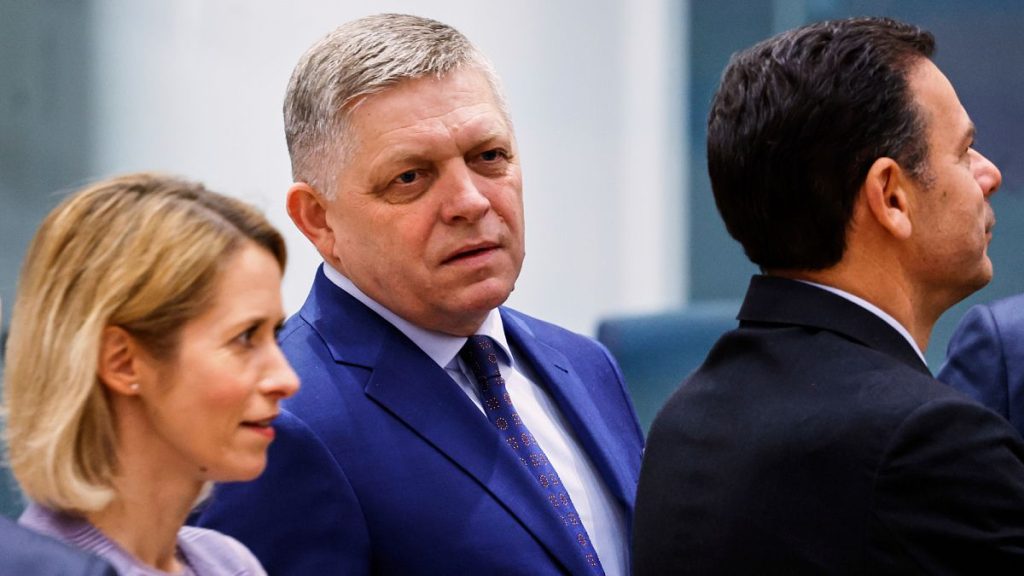In a bid to address growing tensions amid ongoing geopolitical conflicts, Slovakia is actively pursuing an agreement with European partners regarding the nation’s reliance on Russian gas supplies. Prime Minister Robert Fico announced on Saturday that he aims to finalize discussions by Tuesday, setting a critical deadline for approving a new package of EU sanctions against Russia. The current standstill is largely due to Slovakia’s reservations about the proposed phase-out of Russian fossil fuels, a move that could significantly impact the nation’s economic landscape.
| Article Subheadings |
|---|
| 1) Slovakia’s Energy Dependency on Russia |
| 2) The Proposed Sanctions and Their Implications |
| 3) Political Maneuverings: Fico’s Strategy |
| 4) The Role of European Collaborations |
| 5) Future Prospects for Slovakia and the EU |
Slovakia’s Energy Dependency on Russia
Slovakia’s energy landscape is characterized by a heavy reliance on Russian gas, which accounts for a significant portion of its overall energy consumption. The nation imports the vast majority of its natural gas from Russia, with a long-term contract with Gazprom in place until 2034. This dependency raises concerns among Slovak officials regarding economic impacts should sanctions lead to disruption in supply. The country’s energy infrastructure is already under strain; any drastic measures could worsen the situation for consumers and businesses alike, prompting the government to approach sanctions with caution.
The Proposed Sanctions and Their Implications
The latest package of sanctions proposed by EU officials seeks to impose further restrictions on Russian entities, including a blockade on transactions with 22 Russian banks and an extension of existing measures to foreign entities that help circumvent sanctions. This package, announced by European Commission President Ursula von der Leyen and High Representative Kaja Kallas, aims to deliver a considerable blow to Russia’s financial capabilities. While intended to pressure the Kremlin, these sanctions carry the potential for significant economic repercussions not only for Russia but also for countries like Slovakia that remain economically tied to Moscow.
Political Maneuverings: Fico’s Strategy
Prime Minister Robert Fico has indicated a readiness to negotiate for Slovakia’s interests amidst the evolving political landscape. His call for legal guarantees from Gazprom highlights a cautious approach aimed at protecting Slovakia’s economic stake in Russian energy supplies. Fico has communicated his desire to resolve the issue by Tuesday, indicating a sense of urgency due to growing tensions within the EU. His intentions appear to align with broader European goals while simultaneously advocating for Slovakia’s unique position to mitigate potential economic fallout.
The Role of European Collaborations
As Slovakia navigates this complex situation, collaboration among European nations will be pivotal. Prime Minister Fico has engaged in discussions with leaders from Germany, including Chancellor Friedrich Merz, to find common ground. This unity among EU partners is crucial; Slovakia’s stance on sanctions could be pivotal in shaping future negotiations about energy security and economic stability within the EU. The urgency of these discussions is underscored by the geopolitical backdrop, including the ongoing war in Ukraine, which adds a layer of complexity to energy policy across Europe.
Future Prospects for Slovakia and the EU
Looking ahead, the path forward for Slovakia involves balancing its energy needs with international obligations. The potential for an agreement on gas supplies could enable the country to lift its veto on the sanctions package and align itself with broader European efforts against Russian aggression. However, any agreement must prioritize economic safeguards to ensure Slovakia’s energy stability. In this context, the potential outcomes of negotiations will not only impact Slovakia but may also reverberate across the EU, influencing collective policies concerning energy dependency and security.
| No. | Key Points |
|---|---|
| 1 | Slovakia is negotiating gas supply agreements to address EU sanctions against Russia. |
| 2 | The proposed sanctions could significantly affect Slovakia’s economy due to its reliance on Russian energy. |
| 3 | Prime Minister Robert Fico emphasizes the need for legal guarantees to protect Slovakia’s energy interests. |
| 4 | Slovakia’s negotiations involve close collaboration with other EU nations, particularly Germany. |
| 5 | Future negotiations could impact Slovakia and broader EU policies on energy security. |
Summary
The ongoing negotiations between Slovakia and European partners underscore the complex interplay of energy dependence, economic interests, and geopolitical considerations amid rising tensions caused by the war in Ukraine. With Prime Minister Robert Fico advocating for a balance between Slovakia’s energy needs and the EU’s sanctions agenda, the coming days are crucial for determining the nation’s position within this evolving landscape. As Slovakia seeks to safeguard its economic interests, its approach to resolving these issues may serve as a critical precedent for future EU energy policies.
Frequently Asked Questions
Question: Why is Slovakia seeking a deal on Russian gas supplies?
Slovakia aims to finalize discussions on Russian gas supplies to lift its veto on a new package of EU sanctions against Russia, in light of rising geopolitical tensions.
Question: How has the proposed sanctions package affected Slovakia?
The proposed sanctions could severely impact Slovakia’s economy due to its heavy reliance on Russian energy, which raises concerns among officials regarding supply disruptions.
Question: What is Prime Minister Fico requesting in the negotiations?
Prime Minister Fico is seeking legal guarantees from Gazprom to protect Slovakia’s energy interests while addressing the broader EU sanctions on Russian gas.


